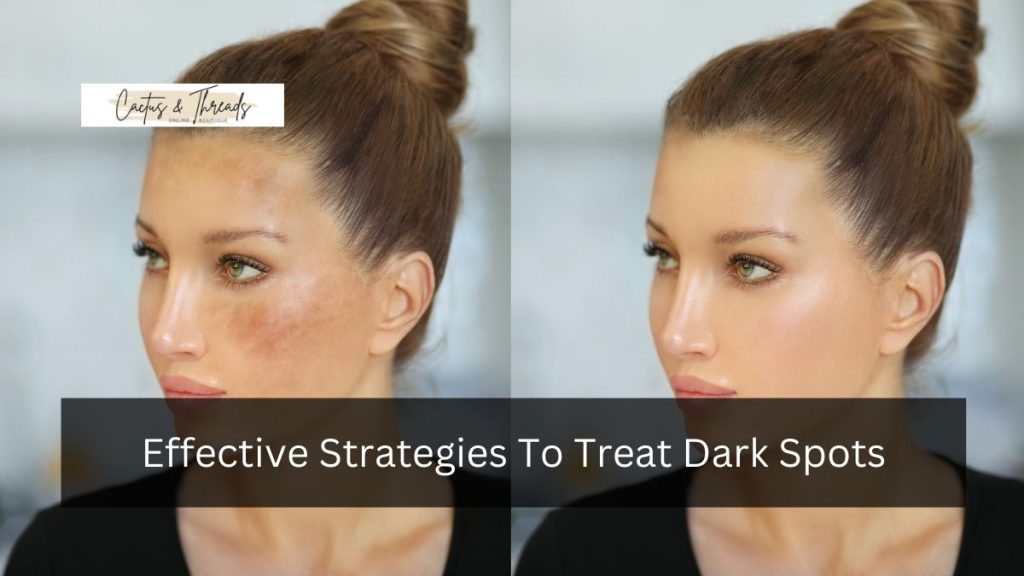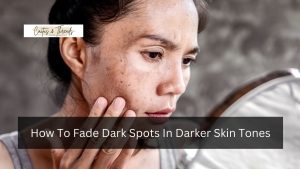
Dark spots, also known as hyperpigmentation, are common skin concerns that can affect individuals of all skin types and ages.
They result from an overproduction of melanin, the pigment responsible for skin color, leading to patches that are darker than the surrounding skin. Understanding the causes and implementing effective treatments can help achieve a more even and radiant complexion.
Understanding Dark Spots
Dark spots can arise from various factors, including:
- Sun Exposure: Ultraviolet (UV) rays stimulate melanin production, leading to sunspots or age spots.
- Post-Inflammatory Hyperpigmentation (PIH): Skin injuries or inflammations, such as acne, can leave behind dark marks after healing.
- Hormonal Changes: Conditions like melasma are triggered by hormonal fluctuations, often during pregnancy or due to contraceptive use.
- Medications: Certain drugs can increase skin sensitivity to sunlight, resulting in dark spots.
Preventive Measures
Prevention is crucial in managing dark spots. Key strategies include:
- Daily Sunscreen Use: Apply a broad-spectrum sunscreen with at least SPF 30 every day, regardless of weather conditions. Reapply every two hours when exposed to sunlight.
- Protective Clothing: Wear hats, sunglasses, and long sleeves to shield skin from UV rays.
- Avoid Picking at Skin: Refrain from squeezing pimples or picking at scabs to prevent PIH.
Topical Treatments
Several over-the-counter and prescription topical agents can help lighten dark spots:
- Hydroquinone: A skin-lightening agent that inhibits melanin production. Available in concentrations up to 2% over-the-counter and higher by prescription.
- Retinoids: Vitamin A derivatives that promote cell turnover, helping to fade hyperpigmentation. Retinol is available over-the-counter, while stronger retinoids require a prescription.
- Vitamin C: An antioxidant that brightens skin and reduces melanin formation. Look for serums with stable forms of vitamin C for optimal efficacy.
- Niacinamide: Also known as vitamin B3, it helps reduce the appearance of dark spots and improves skin texture.
- Azelaic Acid: Effective in treating PIH and melasma by inhibiting melanin production.
Chemical Peels
Chemical peels involve applying a solution to exfoliate the skin’s surface, promoting the growth of new, evenly pigmented skin. Options include:
- Alpha Hydroxy Acids (AHAs): Such as glycolic acid, effective for mild hyperpigmentation.
- Beta Hydroxy Acids (BHAs): Like salicylic acid, beneficial for acne-related dark spots.
It’s essential to have chemical peels performed by a qualified professional to minimize risks.
Laser Treatments
Laser therapy targets melanin deposits, breaking them down to reduce the appearance of dark spots. Types include:
- Intense Pulsed Light (IPL): Uses broad-spectrum light to treat pigmentation.
- Fractional Lasers: Target specific areas, promoting collagen production and skin renewal.
Consult with a dermatologist to determine the most suitable laser treatment based on skin type and severity of hyperpigmentation.
Natural Remedies
Some individuals opt for natural treatments, though their efficacy may vary:
- Aloe Vera: Contains aloin, which may lighten hyperpigmentation.
- Licorice Extract: Inhibits melanin production and has anti-inflammatory properties.
- Green Tea Extract: Antioxidant-rich, it may help reduce melanin formation.
While natural remedies are generally safe, it’s advisable to perform a patch test to check for any adverse reactions.
Professional Consultation
If over-the-counter treatments are ineffective, consulting a dermatologist is recommended. They can provide personalized treatment plans, which may include prescription-strength medications or in-office procedures.
Consistency and Patience
Treating dark spots requires consistent application of treatments and patience, as results can take weeks to months to become noticeable. Adhering to a skincare routine and protecting the skin from further UV exposure are vital for successful outcomes.
Conclusion:
Addressing dark spots involves a combination of preventive measures, topical treatments, and, in some cases, professional interventions.
By understanding the causes and available treatments, individuals can take proactive steps toward achieving a clearer, more even complexion. Always consult with a skincare professional to determine the most appropriate approach for your specific skin concerns.
READ ALSO:







